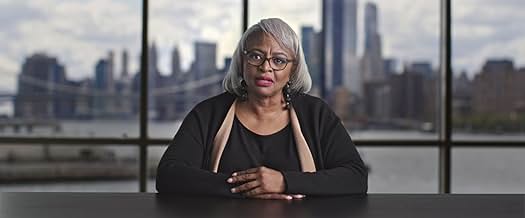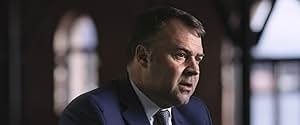VALUTAZIONE IMDb
6,9/10
2101
LA TUA VALUTAZIONE
Date uno sguardo alla storia e all'attuale attivismo contro la repressione degli elettori; barriere al voto che la maggior parte delle persone non sanno nemmeno è una minaccia ai loro diritt... Leggi tuttoDate uno sguardo alla storia e all'attuale attivismo contro la repressione degli elettori; barriere al voto che la maggior parte delle persone non sanno nemmeno è una minaccia ai loro diritti fondamentali come cittadini degli Stati Uniti.Date uno sguardo alla storia e all'attuale attivismo contro la repressione degli elettori; barriere al voto che la maggior parte delle persone non sanno nemmeno è una minaccia ai loro diritti fondamentali come cittadini degli Stati Uniti.
- Candidato a 1 Primetime Emmy
- 6 vittorie e 16 candidature totali
Lyndon B. Johnson
- Self
- (filmato d'archivio)
Recensioni in evidenza
Greetings again from the darkness. Stacey Abrams is a generational spokesperson, and may very well be the future of the Democrat Party. This despite being recently passed over as Joe Biden's running mate. Ms. Abrams is a producer on this film co-directed by Lisa Cortes (HIP HOP X FASHION, 2019) and Liz Garbus (nominated for 2 Oscars: WHAT HAPPENED MISS SIMONE, 2015 and THE FARM: ANGOLA, USA, 1998). She also appears on camera numerous times speaking to us about voter suppression - something which impacted her directly.
The film provides an historical look at the different ways voters have been suppressed and elections manipulated over the years - dating back to 1789, when the film informs, only 6% of the population was eligible to vote: white male property owners. We hear from many historians, authors, politicians, and activists, yet it's Ms. Abrams who stands out. She takes us through her personal background and describes in detail the influence her parents had on her. We also learn much about the 2016 Georgia Governor's race, where Ms. Abrams faced off against Brian Kemp. In one of the more startling statistics, we are told that as Georgia Secretary of State, Mr. Kemp purged 1.4 million voters from the Georgia registry.
A true history lesson on voter suppression is provided, with much of the lesson and commentary provided by Ms. Abrams and author Carol Anderson, who wrote the 2018 book, "One Person, No Vote: How Voter Suppression is Destroying Democracy". We also hear from others, including 88 year old Andrew Young, one of the leaders of the Civil Rights movement, and a former Mayor of Atlanta and former US Ambassador to the United Nations.
So many aspects of United States elections are discussed, and these include the Reconstruction era after the Civil War, the 19th Amendment, President Lyndon Johnson and Voting Rights Act, Gerrymandering, Voter ID requirements, Poll taxes and literacy tests, and the landmark 2013 case, Shelby County v Holder, resulting in a US Supreme Court decision that has impacted voter access. We see clips of the 30th anniversary of the Walk across the Edmund Pettus Bridge in Selma, Alabama, and it's clear Civil Rights and Voting Rights are forever bound.
The documentary is important as it connects history with the modern day issues resulting in voter suppression. Ms. Abrams and Ms. Armstrong are vital voices on a topic that should have been laid to rest many years ago; yet as long as the thirst for political power exists, manipulation of the system will be attempted. So, it's important that every citizen understand how this happens and what to be aware of.
The film provides an historical look at the different ways voters have been suppressed and elections manipulated over the years - dating back to 1789, when the film informs, only 6% of the population was eligible to vote: white male property owners. We hear from many historians, authors, politicians, and activists, yet it's Ms. Abrams who stands out. She takes us through her personal background and describes in detail the influence her parents had on her. We also learn much about the 2016 Georgia Governor's race, where Ms. Abrams faced off against Brian Kemp. In one of the more startling statistics, we are told that as Georgia Secretary of State, Mr. Kemp purged 1.4 million voters from the Georgia registry.
A true history lesson on voter suppression is provided, with much of the lesson and commentary provided by Ms. Abrams and author Carol Anderson, who wrote the 2018 book, "One Person, No Vote: How Voter Suppression is Destroying Democracy". We also hear from others, including 88 year old Andrew Young, one of the leaders of the Civil Rights movement, and a former Mayor of Atlanta and former US Ambassador to the United Nations.
So many aspects of United States elections are discussed, and these include the Reconstruction era after the Civil War, the 19th Amendment, President Lyndon Johnson and Voting Rights Act, Gerrymandering, Voter ID requirements, Poll taxes and literacy tests, and the landmark 2013 case, Shelby County v Holder, resulting in a US Supreme Court decision that has impacted voter access. We see clips of the 30th anniversary of the Walk across the Edmund Pettus Bridge in Selma, Alabama, and it's clear Civil Rights and Voting Rights are forever bound.
The documentary is important as it connects history with the modern day issues resulting in voter suppression. Ms. Abrams and Ms. Armstrong are vital voices on a topic that should have been laid to rest many years ago; yet as long as the thirst for political power exists, manipulation of the system will be attempted. So, it's important that every citizen understand how this happens and what to be aware of.
"The consequences of anybody here, not turning out and doing everything you can to get your friends, neighbors, family to turn out, the consequences of you staying home would be profoundly dangerous to this country, to our democracy." Barack Obama
That a particular party might like to suppress the votes of its opponents makes some sense in the winner-take-all mantra of any race, but that racial and ethnic suppression does happen is always a shock to those who believe the process of democratic election is sacrosanct. Directors Lisa Cortes and Liz Garbus' insightful documentary All in: The Fight for Democracy dispels any notion that America's elections are pure and unadulterated.
As the centerpiece of this study that covers the history of election fraud and questionable practices up to 2020 in Wisconsin, the Stacey Abrams run for Georgia governor in 2018 best expresses the frustrations of Democrats who perceived the Republicans were throwing up roadblocks from difficult qualifying questions to delayed polls. Abrams fought to the bitter end with only a few thousand votes outstanding and her awareness that she would never win.
Perhaps most dismaying is that Brian Kemp won by 25 K votes among 4 million while over 100,000 were disqualified for not having voted enough previous times. I am personally disappointed that my home state of Ohio has the same illogical suppression.
Abrams' Republican opponent, Brian Kemp, won with the advantage of these "hoops" that minority voters had to jump through, often answering questions like "Who is the clerk of the Superior Court?" He was the Secretary of State in charge of the election process while running for governor, illegal in some states but not Georgia. Such obvious conflicts of interest throw negative light on elections everywhere. However, the co-directors show how voter suppression was common throughout the history of the "Republic." Progressives and moderates have been fighting to suppress the suppression for centuries.
Early on this informative doc shows other manipulative tactics such as gerrymandering, poll taxes, and demands for government ids to keep away the poor, resulting in making the 13th, 14th, and 15th amendments impotent legislation. What the doc does not do is to present a fair assessment by conservatives about why they favored the suppressive legislations. The other side should always be allowed to defend itself in even benign docs like this.
If for nothing else, this important documentary emphasizes the need to vote early, check on the vote's being processed, and exalt in a flawed but fair election. We'll see.
That a particular party might like to suppress the votes of its opponents makes some sense in the winner-take-all mantra of any race, but that racial and ethnic suppression does happen is always a shock to those who believe the process of democratic election is sacrosanct. Directors Lisa Cortes and Liz Garbus' insightful documentary All in: The Fight for Democracy dispels any notion that America's elections are pure and unadulterated.
As the centerpiece of this study that covers the history of election fraud and questionable practices up to 2020 in Wisconsin, the Stacey Abrams run for Georgia governor in 2018 best expresses the frustrations of Democrats who perceived the Republicans were throwing up roadblocks from difficult qualifying questions to delayed polls. Abrams fought to the bitter end with only a few thousand votes outstanding and her awareness that she would never win.
Perhaps most dismaying is that Brian Kemp won by 25 K votes among 4 million while over 100,000 were disqualified for not having voted enough previous times. I am personally disappointed that my home state of Ohio has the same illogical suppression.
Abrams' Republican opponent, Brian Kemp, won with the advantage of these "hoops" that minority voters had to jump through, often answering questions like "Who is the clerk of the Superior Court?" He was the Secretary of State in charge of the election process while running for governor, illegal in some states but not Georgia. Such obvious conflicts of interest throw negative light on elections everywhere. However, the co-directors show how voter suppression was common throughout the history of the "Republic." Progressives and moderates have been fighting to suppress the suppression for centuries.
Early on this informative doc shows other manipulative tactics such as gerrymandering, poll taxes, and demands for government ids to keep away the poor, resulting in making the 13th, 14th, and 15th amendments impotent legislation. What the doc does not do is to present a fair assessment by conservatives about why they favored the suppressive legislations. The other side should always be allowed to defend itself in even benign docs like this.
If for nothing else, this important documentary emphasizes the need to vote early, check on the vote's being processed, and exalt in a flawed but fair election. We'll see.
Unfair, undemocratic, biased, discriminatory, immoral, partisan, autocratic, oppressive; with a common denominator the world over - white middle aged and older men, who are the curse of freedom, truth and democracy (obvs. not all of them). They've been around a while, just search for 'A Rotten Borough' online to find out more.
Being able to vote as a legitimate resident in any country should be as easy as going outside and holding up your arm. If your views are then reflected in representatives appointed through proportional representation, you have democracy. Break either of those rules and, as much as you'd like to think otherwise, you're under the control of others and, most likely, through men with the common attributes and characteristics previously alluded to - another one of them being they don't like your right to vote if you're not like them.
Being able to vote as a legitimate resident in any country should be as easy as going outside and holding up your arm. If your views are then reflected in representatives appointed through proportional representation, you have democracy. Break either of those rules and, as much as you'd like to think otherwise, you're under the control of others and, most likely, through men with the common attributes and characteristics previously alluded to - another one of them being they don't like your right to vote if you're not like them.
Just a heads up that this documentary is currently being review-bombed currently across multiple platforms by bots and people who have not actually watched the documentary.
This documentary is really well done. It goes over the entire history of the right to vote within the United States from beginning to current events. It goes over the right to vote for women and for African Americans. It also goes over the times when we have stepped backwards on that right, such as the Chinese exclusion act, that have caused harm to that right.
It's an extremely eye opening documentary that tries to explain why the right to vote is something worth continually monitoring and continually fighting for to ensure fair and honest elections.
Other people reviewing this documentary are trying to say it's biased in some way; I disagree. I think that it does a pretty good job at explaining suppression events that have happened and how it's a concern for anyone regardless of their political views. The events they show are wrong regardless of the party involved. The documentary tries to shine a light on that fact to encourage more people to use their right to vote.
This documentary is really well done. It goes over the entire history of the right to vote within the United States from beginning to current events. It goes over the right to vote for women and for African Americans. It also goes over the times when we have stepped backwards on that right, such as the Chinese exclusion act, that have caused harm to that right.
It's an extremely eye opening documentary that tries to explain why the right to vote is something worth continually monitoring and continually fighting for to ensure fair and honest elections.
Other people reviewing this documentary are trying to say it's biased in some way; I disagree. I think that it does a pretty good job at explaining suppression events that have happened and how it's a concern for anyone regardless of their political views. The events they show are wrong regardless of the party involved. The documentary tries to shine a light on that fact to encourage more people to use their right to vote.
"Then you ask yourself, why do we have this architecture of all of these obstacles - voter ID, gerrymandering, purging, poll closures - why do we have all of this if voter fraud is virtually nonexistent? When you ask that question that way, then it leads you down a path where America must look at itself again, the way that it looked at itself when it saw the cataclysm on the Edmund Pettus Bridge." -- Professor Carol Anderson
A documentary that works pretty well as a history lesson of voter suppression in America, covering its founding, Reconstruction, the Jim Crow south, and the Civil Rights movement in ways that are accessible and informative. More importantly, it connects the dots to the present day, leading to the shameful gutting of the Voting Rights Act in the Shelby County v. Holder Supreme Court decision, and its creation of "Jim Crow 2.0" as Carol Anderson put it. I liked how it reminds us of Chief Justice John Roberts' apprenticeship under William Rehnquist, and the latter's role on the front lines of voter suppression in Arizona in the 1960's. I liked how it also reminded us of the genesis of Florida's ban on ex-felons voting (hint: it's racist). The film puts a lot of its focus on Stacey Abrams and her narrow loss in Georgia's 2018 gubernatorial election, one rife with voter suppression and certainly a worthy topic (she's such a fantastic leader!), though I think it sacrifices a few things as a result, such as the disastrous Rucho v. Common Cause gerrymandering decision. It does present the case that change is only possible through sustained effort and protest, and that voting is a critical part of democracy, serving as an effective call to action. Overall, well worth watching, as the fight continues.
A documentary that works pretty well as a history lesson of voter suppression in America, covering its founding, Reconstruction, the Jim Crow south, and the Civil Rights movement in ways that are accessible and informative. More importantly, it connects the dots to the present day, leading to the shameful gutting of the Voting Rights Act in the Shelby County v. Holder Supreme Court decision, and its creation of "Jim Crow 2.0" as Carol Anderson put it. I liked how it reminds us of Chief Justice John Roberts' apprenticeship under William Rehnquist, and the latter's role on the front lines of voter suppression in Arizona in the 1960's. I liked how it also reminded us of the genesis of Florida's ban on ex-felons voting (hint: it's racist). The film puts a lot of its focus on Stacey Abrams and her narrow loss in Georgia's 2018 gubernatorial election, one rife with voter suppression and certainly a worthy topic (she's such a fantastic leader!), though I think it sacrifices a few things as a result, such as the disastrous Rucho v. Common Cause gerrymandering decision. It does present the case that change is only possible through sustained effort and protest, and that voting is a critical part of democracy, serving as an effective call to action. Overall, well worth watching, as the fight continues.
Lo sapevi?
- ConnessioniReferenced in Late Night with Seth Meyers: Stacey Abrams/David Byrne/Sonny Emory (2020)
- Colonne sonoreTurn Tables
Written by Janelle Monáe, Nate 'Rocket' Wonder, and George A. Peters II
Performed by Janelle Monáe
Produced by Nate 'Rocket' Wonder and Roman GianArthur Irvin
I più visti
Accedi per valutare e creare un elenco di titoli salvati per ottenere consigli personalizzati
Dettagli
- Data di uscita
- Paese di origine
- Sito ufficiale
- Lingua
- Celebre anche come
- Her Şey Dahil: Demokrasi Mücadelesi
- Aziende produttrici
- Vedi altri crediti dell’azienda su IMDbPro
- Tempo di esecuzione
- 1h 42min(102 min)
- Colore
Contribuisci a questa pagina
Suggerisci una modifica o aggiungi i contenuti mancanti
































